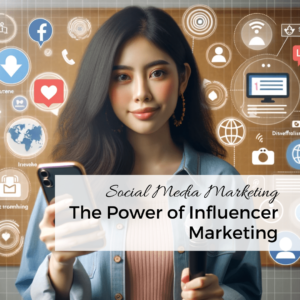- +1 512-591-8295
- [email protected]
- Mon - Fri: 9:00 - 16:00

If you’re like most entrepreneurs, as you’re growing and scaling your business, you probably get to a point that you realize that word-of-mouth (despite it’s effectiveness) and traditional marketing channels just aren’t cutting it anymore. Enter influencer marketing—a strategy that can amplify your brand’s reach and credibility in ways you’ve never imagined. I know … your brain immediately says “but I can’t afford Kylie Jenner!” So how can a small business like yours leverage this? Read on.
Influencer marketing isn’t just for big brands with deep pockets. In fact, it’s becoming increasingly accessible for businesses of all sizes, including solo entrepreneurs and small teams.
In today’s digital landscape, consumers crave authenticity. They’re more likely to trust a recommendation from a real person over a faceless brand. Influencer marketing taps into this trust, providing a genuine connection between your product and your audience.
ROI isn’t just a buzzword; it’s a critical measure of success. When done right, influencer marketing can offer impressive returns, sometimes outperforming other marketing channels in terms of customer acquisition and conversion rates.
Building brand awareness is another key benefit. By aligning with an influencer who shares your brand values (and do not miss the importance of this!), you can introduce your products or services to a whole new audience, exponentially increasing your reach.
The influencer landscape is changing. Mega-influencers – like any of the Jenners or Kardashians – while still getting their deals are making way for local, smaller micro-influencers. This shift is a game-changer for small businesses. Why? Because micro-influencers are more accessible, often more trusted, and can offer a more authentic, localized marketing strategy.
Not all influencers are created equal.
Micro-influencers, those with a smaller but highly engaged following, can often provide better ROI than their macro counterparts. Industry-specific influencers can offer targeted reach, while celebrity endorsements, though expensive, can provide a significant boost in brand awareness.
Choosing the right influencer is crucial. Look for someone whose brand values align with yours. Their audience demographics should mirror your target market, and engagement metrics like likes, shares, and comments can offer insights into how effective their posts are.
You know you need an influencer, but how do you integrate this into your existing marketing strategy? Planning is key.
Start by setting clear goals. Are you looking to increase brand awareness, drive traffic to your website, or improve sales conversions? Your goals will dictate your KPIs, helping you measure the success of your campaign.
Influencer marketing doesn’t have to break the bank. Many influencers are open to product exchanges or long-term partnerships that can be more cost-effective. However, never assume that any influencer will be excite and willing to promote your business just because you offer them products. Some are only interested in monetary benefit.
Micro-influencers may be more willing to create a flexible agreement with you that works best for you both; while larger influencers probably have set deals that they rarely stray from.
Contracts aren’t just paperwork; they’re essential for protecting both parties. Make sure your agreement covers all bases, including deliverables, timelines, and any legal obligations like FTC guidelines for sponsored content.
You also need to understand what you are looking for in return. A post? A video/reel? And how long must the influencer keep it live? Will they give you license to use it in your own marketing, and if so, how long? Always have a clear agreement in place, outlining expectations and compensation.
So you’ve launched your campaign. Now what? Tracking and analysis are crucial for understanding the impact of your efforts.
There are various tools available to track key metrics like engagement rates, website traffic, and conversion rates. These will help you understand what’s working and what needs adjustment.
Learning from both successes and failures can offer invaluable insights. Case studies can provide a comprehensive view of what works and what doesn’t, helping you refine your future strategies.
The digital landscape is ever-changing. Being adaptable and staying ahead of trends can ensure the longevity of your influencer marketing efforts.
At Vicky Wu Marketing, we understand the unique challenges you face as an entrepreneur. With over 30 years of experience at the CMO and CEO levels, we offer bespoke and holistic strategies tailored to your specific needs. We focus on Beyond-the-Graph Growth™, balancing hard statistics with softer elements like customer satisfaction and stress management. Our 360° Marketing Assessment is the first step in crafting a tailor-made strategy for you, covering everything from SEO to customer engagement.
Micro-influencers typically have a smaller but more engaged following, usually ranging from 1,000 to 100,000 followers. Macro-influencers have a much larger following but may not have the same level of engagement or niche focus.
Key performance indicators (KPIs) like engagement rates, website traffic, and conversion rates are essential for measuring the success of your campaign. Tools like Google Analytics can provide valuable insights.
Absolutely. Many micro-influencers are open to product exchanges or long-term partnerships, making this a cost-effective strategy for small businesses.
Always have a clear contract in place that outlines deliverables, timelines, and legal obligations, such as FTC guidelines for sponsored content and individual platform requirements.
We offer a holistic, bespoke approach to influencer marketing, focusing on Beyond-the-Graph Growth™. Our 360° Marketing Assessment is the first step in crafting a tailor-made strategy for you.
Ready to leverage the power of influencer marketing to grow your business?
Curious How to Leverage the Power of Influencer Marketing?
Schedule your free 360° Marketing Assessment with Vicky Wu Marketing today and take the first step toward a tailor-made strategy that works for you.
Get solid marketing strategies, designed for entrepreneurs on the track to 7-figures and beyond, right in your inbox.

This website uses cookies to ensure you get the best experience on our website. By continuing to use the website, you agree to our use of cookies. We do not share or sell your information. More info
